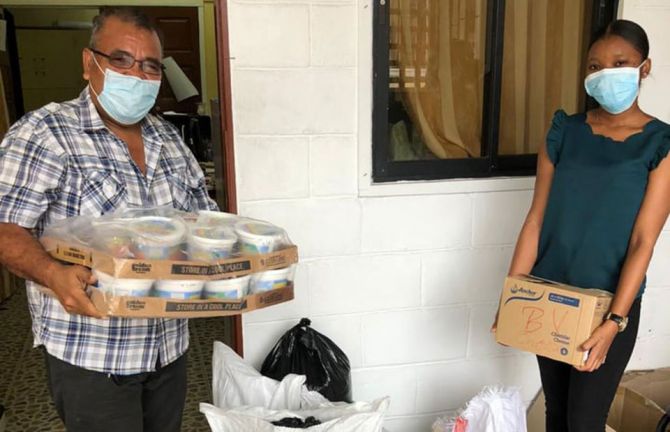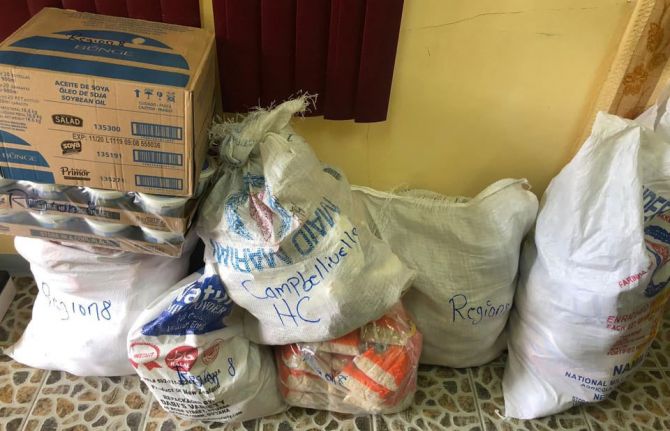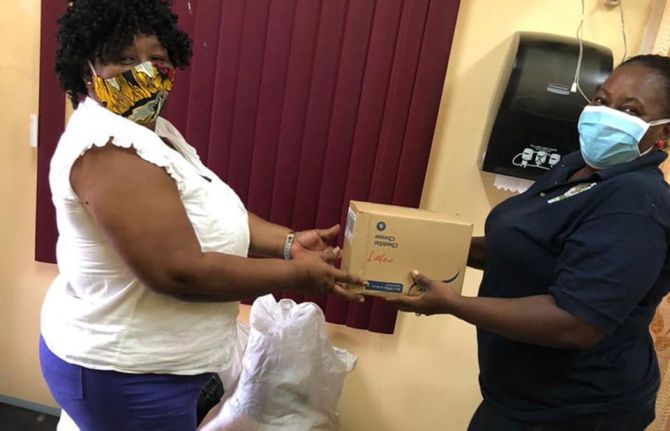



Feature Story
Guyana’s HIV food bank comes to the rescue during COVID-19
04 September 2020
04 September 2020 04 September 2020For many Guyanese families, COVID-19 has meant far more than mask-use and movement restrictions.
“The disruptive effect on economic activity means that for some there simply is not enough food,” said Michel de Groulard, UNAIDS Country Director, a.i., for Guyana and Suriname.
But for people living with HIV in Guyana, there’s been no need for a hastily improvised nutrition support solution. For almost 14 years the National AIDS Programme secretariat has invested in the development of a food bank specifically for people living with HIV, including those coinfected with tuberculosis.
The programme started with support from the Global Fund to Fight AIDS, Tuberculosis and Malaria (Global Fund) and continues to receive Global Fund contributions. From the start there were consistent, major donations from the National Milling Company of Guyana. Since 2017, the Government of Guyana and the Food for the Poor charitable organization have been the primary donors. Importantly, throughout the years the food bank has attracted significant inputs from the private sector. In 2019, there were more than 20 corporate contributors.
Referrals come from the clinical teams attending to people living with HIV. Food support is granted for an initial six-month period, after which the situation is reassessed. In the interim there is a collaborative effort with the Ministry of Social Protection and the Recruitment and Manpower Agency around job placement and other types of social support.
Rhonda Moore worked as an HIV doctor for six years and in three regions before assuming leadership of the National AIDS Programme. She’s seen the difference nutrition assistance makes for people and families on the brink. When people are worried about whether they will eat, they don’t take their treatment properly.
“Food insecurity creates a vicious cycle,” she said. “For people living with HIV it is important to have a healthy, balanced diet along with treatment to control the disease. But when someone doesn’t have food it affects them both mentally and physically. Adherence becomes an issue and the mental health impact also undermines the immune system.”
In the context of COVID-19, the food bank has expanded its reach to HIV-negative members of key populations. The National AIDS Programme is collaborating with community organizations to pair dissemination with the provision of information on COVID-19 and HIV as well as HIV prevention and testing services.
So far, more than 2700 food and personal hygiene packages have been distributed. Rather than have people journey to the food bank, the supplies are now being distributed through the treatment sites in their districts. An open invitation was issued to diagnosed people who hadn’t started or continued antiretroviral therapy to go to their nearest treatment centres for HIV medicines and food—two essentials for surviving COVID-19.
In 2019, Guyana became the first Caribbean country to introduce national nutrition and HIV guidelines. The strategy supports health-care providers, policymakers, social workers and other HIV response stakeholders in responding to the nutrition care and support needs of people living with HIV in diverse conditions. In an epidemic response often dominated by concerns around treatment, Guyana has been proactive about addressing the food insecurity challenge some people living with HIV face either consistently or—as is the case with COVID-19—in exceptional circumstances.
“HIV treatment will fail if people don’t have food—healthy food. The fact that Guyana has been able to respond immediately to alleviate food security challenges and thus protect the well-being of people living with HIV right from the outset of the humanitarian crisis demonstrates the value of making psychosocial support investments integral to our regular treatment programme,” Mr de Groulard said. “It makes countries and communities more resilient, more agile and better prepared to respond to crises.”



